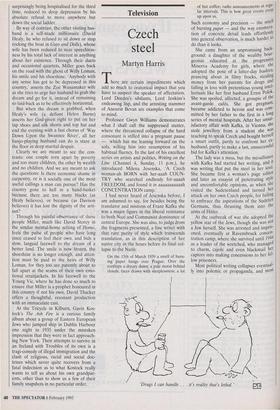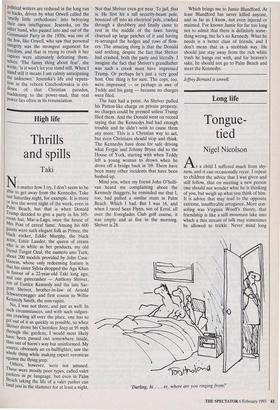Television
Czech steel
Martyn Harris
here are certain impediments which add so much to oratorical impact that you have to suspect the speaker of affectation. Lord Deedcs's sibilants, Lord Jenkins's endeawing lisp, and the arresting stammer of Aneurin Bevan are examples that come to mind.
Professor Gwyn Williams demonstrates what I shall call the suppressed stutter, where the threatened collapse of the hard consonant is stifled into a pregnant pause — which has me leaning forward on the sofa, willing him into resumption of his habitual fluency. In the last of his excellent series on artists and politics, Writing on the Line (Channel 4, Sunday, 11 p.m.), he introduced Milena Jesenska, 'A Czech woman-ah BORN with her-aaah COUN- TRY who searched endlessly for-aaaah FREEDOM, and found it in aaaaaaaaaaah CONCENTRATION camp.'
I had never heard of Jesenska before, I am ashamed to say, for besides being the translator and mistress of Franz Kafka she was a major figure in the liberal resistance to both Nazi and Communist dominance of central Europe. She was also, to judge from the fragments presented, a fine writer with that rare purity of style which transcends translation, as in this description of her native city in the hours before its final col- lapse to the Nazis:
On the 15th of March 1939 a smell of burn- ing paper hangs over Prague. Over the rooftops a dreary dawn; a pale moon behind clouds; faces drawn with sleeplessness; a lot
of hot coffee; radio announcements at regu- lar intervals. This is how great events creep up upon us.
Such economy and precision — the smell of burning paper — and the way enumera- tion of concrete detail leads effortlessly into general observation, is much harder to do than it looks.
She came from an unpromising
back- ground: a daughter of the wealthy bour- geoisie educated at the progressive Minerva Academy for girls, where she adopted the pose of a latter-day lsadora, prancing about in filmy frocks, stealing money from her parents for drugs and n falling in love with pretentious young intel- lectuals like her first husband Ernst Pioltoeki. She was spoiled, affected, a groupie of the avant-garde cafés. She got pregnant, became addicted to heroin and was com- mitted by her father to the first in a long series of mental hospitals. After her unsat- isfactory affair with Kafka, in Vienna, she stole jewellery from a student she was teaching to speak Czech and bought herself a smart outfit, partly to confront her ex- husband, partly to make a last, unsuccessful bid for Kafka's attention.
The lady was a mess, but the mesalliance with Kafka had started her writing, and it was writing that put the steel in her soul. She became first a woman's page editor and later an essayist of penetrating style and uncomfortable opinions, as when she visited the Sudetenland and turned her attack on her own Czech people, for failing to embrace the aspirations of the Sudeten Germans, thus thrusting them into the arms of Hitler.
At the outbreak of war she adopted the yellow star of the Jews, though she was not a Jew herself. She was arrested and impris- oned, eventually at Ravensbruck concen- tration camp, where she survived until 1944 as a leader of the wretched, who managed to charm, cajole and even blackmail her captors into making concessions to her fel- low prisoners. Most political writing collapses eventual- ly into polemic or propaganda, and most
'Drugs I can handle . . . it's reality that's lethal.'
Political writers are reduced in the long run to hacks, driven by what Orwell called the smelly little orthodoxies' into betraying their own intelligence. Jesenska, on the other hand, who passed into and out of the Communist Party in the 1930s, was one of the few, like Orwell, who saw that personal Integrity was the strongest argument for freedom, and that in trying to crush it her captors were ultimately defeating them- selves. 'The funny thing about fear', she wrote, 'is it won't let you stand still. When I stand still it means I am calmly anticipating the unknown.' Jesenska's life and reputa- tion in the reborn Czechoslovakia is evi- dence of that Christian paradox, Maddening to the power-mad, that real Power lies often in its renunciation.























































 Previous page
Previous page